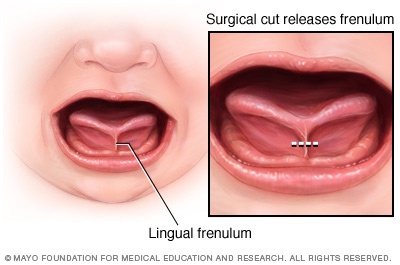In a previous blog post, I mentioned that I would write about some health issues that can be caused by having tongue tie. Tongue tie is not something that is heavily focused on in the curriculum, and conventional medical doctors also receive limited training on how to assess it and the problems that may arise.

Source: mayoclinic.org
The medical terminology for tongue tie is ankyloglossia, and it is a malformation of the tongue that restricts normal movement. In babies, this can negatively impact the transfer of milk when nursing and lead to colic. If it isn’t corrected in a procedure called a frenectomy by either by an ENT doc who snips it, or a dentist who lasers it, future problems can arise.
After researching more, I realize that there are many adults with tongue tie ranging anywhere from mild to severe. Here are some health conditions that may be partially caused by it:
Poor dentition – Restricted tongue movements can reduce the flow of saliva in the mouth, thereby contributing to cavities.
TMJ dysfunction – During development, tongue movements impact the placement of teeth and jaw structure. When the tongue is tied down, the mouth and jaw tend to be smaller and more narrow which contribute to sub-optimal movements of the temporomandibular joint, which can cause pain.
Sleep apnea – Similar to above, limited tongue movements impact normal development and placement of structures and airways tend to be smaller than normal.
Speech issues – Intrinsic and extrinsic tongue muscles must work in harmony to form a variety of tongue movements to produce different speech sounds. When the tongue is restricted, certain sounds are harder to produce like l, r, t, d, n, th, sh, and z, as well as overall articulation of words.
In naturopathic medicine, we always try to find minimally invasive natural methods to improve health such as botanicals, hydration, hydrotherapy, etc. However, for some conditions, such as tongue tie, using high-force intervention like surgery may be necessary!




0 Comments